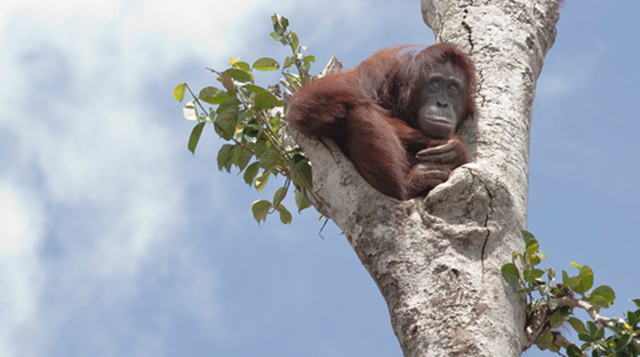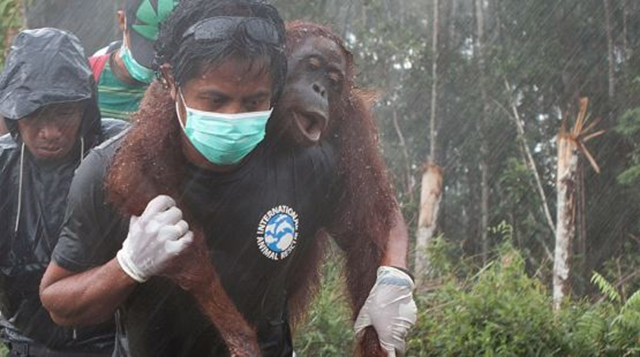Orangutans are victims of ‘sustainable’ palm oil as rainforest is razed – ‘All of the animals on the plantation are threatened. The company must therefore stop clearing the rainforest immediately.’
(Rainforest Rescue) – Perched atop the remains of the last tree, an orangutan looks helplessly on what was until recently the forest he was living in but is now only ruins. Armed with chainsaws and bulldozers, workers of Bumitama Gunajaya Agro (BGA), a palm oil company, have completely destroyed the rainforest for miles. Three other half-starved orangutans – a pregnant female and a mother with her child on her back – were also found crawling around the stumps and tree trunks of the cleared rainforest. “There are more orangutans in the tiny remaining patches of forest in the plantation, along with other protected species such as proboscis monkeys,” explains Adi Irawan of International Animal Rescue Indonesia (IAR). “All of the animals on the plantation are threatened. The company must therefore stop clearing the rainforest immediately.” This may seem hard to believe, but the palm oil producer BGA has been a member of the RSPO, the label for sustainable palm oil, since 2007. BGA’s customers include IOI, Wilmar and Sinar Mas, companies that sell the palm oil to European food and consumer goods manufacturers and biodiesel producers. Even the EU has recognized the RSPO as a certification system for sustainably produced biofuels. Please sign our petition to call for a stop to rainforest destruction and palm oil imports.
The habitat of orangutans and the immense biodiversity of tropical rainforests are being irreparably destroyed for ever-larger palm oil plantations. The animals are not welcome on the plantation clearings, and would not be able to survive there. When summoned, the staff of International Animal Rescue Indonesia (IAR) therefore has no choice but to tranquilize the orangutans, capture them, and take them elsewhere. Video report of the orangutan rescue by International Animal Rescue Yet hardly any replacement habitats remain for the animals. Beyond the cleared rainforest, endless oil palm monocultures extend to the horizon. Throughout Indonesia and in neighboring Malaysia, rainforests are being cut down for ever more oil palm plantations.
RSPO – Sustainable Palm Oil
The Roundtable on Sustainable Palm Oil (RSPO) is an association on nearly 1,200 businesses – plantation companies, palm oil mills and traders, as well as their customers, including European food and consumer products companies such as Nestlé, Unilever and Henkel. A further dozen organizations with close ties to the industry, such as the WWF, serve as a fig leaf for the certification. The RSPO does not rule out the destruction of rainforest land for new oil palm plantations. Only “high conservation value areas” (HCVAs) may not be cleared. Rainforest Rescue is calling for the protection of all rainforest areas. The rainforests of Southeast Asia are home not only to orangutans, but to other endangered species such as proboscis monkeys and other primates, big cats such as tigers and clouded leopards, pygmy elephants, Sumatran rhinos, and many more. Many indigenous peoples and small farmers also rely on rainforests for their homes and livelihoods. 256 environmental, human rights and development organizations from around the world have therefore long rejected the RSPO as fraudulent labeling and greenwashing.
BGA: Bumitama Gunajaya Agro
The Bumitama Gunajaya Agro (BGA) palm oil company is part of the notorious Indonesian Harita Group, a conglomerate with mining (nickel, bauxite, coal), palm oil, tropical timber and cargo shipping interests. The Malaysian palm oil giant IOI, which also operates a major palm oil refinery in Rotterdam (Loders Croklaan) for the European market, holds a one-third stake in BGA. To date, BGA has established 124,000 hectares of oil palm plantations at the expense of Indonesian rainforests in Borneo (West and Central Kalimantan) and Sumatra (Riau). The company has secured a further 65,000 hectares of land and is currently clearing around 13,000 hectares a year in order to cultivate oil palms. [more]

